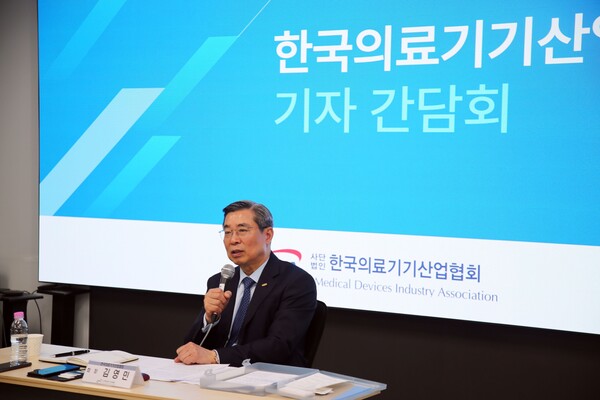The confrontation between the government and the medical community over an increase in medical school enrollment quota also affects the medical device industry, as intermediate suppliers delay payment due to declining revenues at university hospitals.
Kim Young-min, the new chairman of the Korea Medical Device Industry Association (KMDIA), said he would listen to member companies' difficulties and do his best to solve the problem of delayed payment.
Kim said so at his inaugural news conference on Monday. He was elected as the 10th chairman of the association at the annual general meeting on Feb. 27. He will serve a three-year term.

"The ongoing medical turmoil has reaffirmed that the medical device industry is the ‘rock bottom dog’ in the healthcare ecosystem," Kim said. "Medical device industry organizations should speak with one voice on the issue of delayed hospital payments and demands for discounts. I will meet with the heads of various other organizations and seek a joint response."
According to Kim, as sales at university hospitals have declined recently, with surgeries being postponed due to the resignation of trainee doctors, intermediate supplying companies have been delaying payments to medical device makers, citing cash crunches.
Ezmedicom, an intermediate supplier affiliated with Seoul National University Hospital, has reportedly changed the payment period for medical device companies from three months to six months. Opera Salutaris, affiliated with the Catholic University of Korea St. Mary's Hospital, has also notified medical device companies that payments may be delayed.
"We cannot provide a solution right now," Kim said. "However, we will seek a solution through meetings with the heads of organizations and find a way to solve the fundamental problem through the special committee on healthcare reform."
The Special Committee on Healthcare Reform, which officially launched last week, announced that it would collect opinions from various walks of life on healthcare reform and focus on mid- to long-term healthcare reform and priorities for investment in essential healthcare. It will also discuss other issues, including social issues, deemed necessary for discussion.
Kim also promised to enact legislation to regulate intermediaries' unfair behavior, which is a persistent problem. According to the association, the discount rate demanded by these intermediate suppliers is 6 to 7 percent on average. The association estimated that the companies pass on more than 270 billion won ($196 million) in costs to the industry, raking in unfair profits.
"In the 21st National Assembly, a bill to amend the Medical Device Act was proposed by Rep. Seo Jung-sook of the ruling People Power Party, but it has become difficult to discuss now," Kim said. "If it is difficult in this Assembly, we will push for reintroducing the bill in the next parliament."
Specific legislative contents include conducting a fact-finding survey on the current status of medical device purchase leases in cases where medical institutions and medical device sellers have a special relationship, such as relatives within the second degree of consanguinity; establishing a basis for entrusting the task of fact-finding; restricting transactions between sellers (intermediaries) and related parties; reflecting standard contracts and payment deadlines; establishing penalty provisions on the transfer of supply reporting obligations to others and other purchase agency regulations for intermediaries; improving the distribution structure by conducting ex officio investigations into unfair trade practices of intermediaries by the Fair Trade Commission.
Reiterating his pledge to form an industrywide council, which he announced in his inaugural speech in February, Kim said the council's priority will be to address the issue of delayed payments.
"Since the heads of various organizations are newly inaugurated, we are scheduling individual meetings with the heads of each organization," Kim said, "The council's priority is to address the issue of delayed payment. We will continue to meet regularly to strengthen industry cohesion and jointly respond to issues in the medical device industry."
Related articles
- Medical device industry groups of Korea and Taiwan sign MOU
- Pathologists lament slow digital pathology transformation due to lack of reimbursement
- Trainee doctors see government’s promise to improve training environment as a 'bad check'
- [Top 10 Healthcare News in 2024 ①] Medical devices industry devastated by doctor-government conflicts
- Korea tightens surveillance on high-risk implants with long-term tracking system

